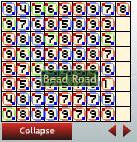Streaks do happen
 I have a friend who is an avid gambler and who subscribes to a bunch of casino magazines.
I have a friend who is an avid gambler and who subscribes to a bunch of casino magazines.
He told me the other day about an article in one of his magazines that detailed how a baccarat dealer somewhere in an American casino had dealt 27 consecutive wins to the Player hand. Amazed at the probability of such an event I asked him to show me the article, which he happily agreed to do.
That was 3 weeks ago, and for one reason or another he has yet to produce the goods, but swears black and blue that this did in fact happen, 27 IS the number, and it is all recorded in print in a very reputable industry periodical.
If and when said magazine is furnished, I’ll do a follow-up piece and fill in the who’s, when’s, where’s and which source, but for the time being have to to be a little scant in this regard so apologies in advance.
Anyway, proceeding on the basis that somewhere in a reputable casino such a streak did in fact happen, I just wanted to ponder the astronomical odds of such an occurrence, as well as the obvious implications for certain systems out there that are touted as sure things.
What are the odds?
Let me just preface the following analysis with the caveat that I’m no game mathematician or maths genius and I’ll be applying what I learned 15 years ago in sixth form permutations and combinations class. Mrs Arnott was a great teacher though and I aced probability, so I’m pretty confident I’ve got a good handle on it.
So the odds of the ‘Player’ winning a distinct deal (according to the wizard of odds) is 0.446427. The odds of the Player winning 2 hands in a row is the simple permutation ‘Player win AND Player win’, expressed mathematically as: –
0.446427 x 0.446427 = 0.1984.
The odds of the Player winning 3 hands in a row is simply 0.1984 x 0.446427 (or 0.446427 to the power 3) = 0.089
You get the idea right? So the odds of 27 Player wins in a row is 0.446427 to the power of 27, or an incomprehensibly minuscule 1 chance in 2,862,449,084.
Let’s just call it 1 in 3 billion.
I think the odds of winning most standard lotteries is around the 1 in 3 million mark. So to put this streak into perspective, it’s 1000 time more remote than winning a lottery. Conversely, your chances of winning the lottery are a thousand times better than ever witnessing such a streak.
Streaks do happen
The other sobering lesson to take from this, is that enormous streaks happen. This one is a once in a lifer, but I’m sure a dozen or so consecutive hands has happened quite often. In roulette terms, black or red winning streaks are common and have led to the undoing of many a faithful Martingale player. Imagine starting with a $5 bet and doubling up each bet. Let’s assume there’s no table limit, and you come up against a losing streak of 12 in a row. Your 13th bet, which will put to $5 up if you win, will be $20,480.
In the very unlikely event that you hit a losing streak of 27 consecutive bets, your 28th will need to be just over $671 million dollars to put you $5 up.
Still want to play Martingale?



What about reverse Martingale method, where you’d double stake upon a win and let’s assume you’d reset a stake to initial after 3 consecutive wins, which would payout 7/1. 3 consecutive winning streaks aren’t rare in Blackjack and as you are ‘reinvesting’ upon each win you are risking same initial stake. At least by doing so you aren’t creating a huge risk to your capital, unlike in Martingale method. But, I guess it’s still an unprofitable method in the long run, due to a negative expected value?